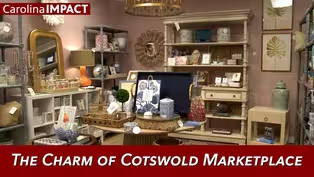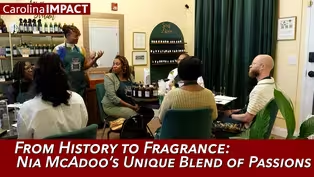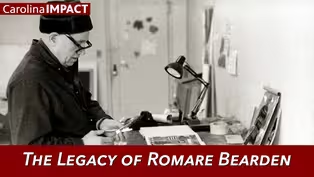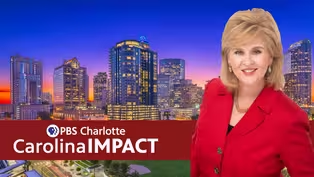
Flower Power: Metrolina Greenhouses | Carolina Impact
Clip: Season 13 Episode 1304 | 7m 23sVideo has Closed Captions
70 million plants. 200 acres. And still growing. Inside America's largest greenhouse.
We call Charlotte the 'Queen City' because of its history. And 'Buzz City' because of the Hornets. Or maybe 'Bank Town' because of all our big financial institutions. But how about 'Flower Town'? America's largest greenhouse is just outside of Charlotte, in Huntersville -- 200 acres under glass, with 70 million plants. And it all started as a mom and pop flower shop.
Problems playing video? | Closed Captioning Feedback
Problems playing video? | Closed Captioning Feedback
Carolina Impact is a local public television program presented by PBS Charlotte

Flower Power: Metrolina Greenhouses | Carolina Impact
Clip: Season 13 Episode 1304 | 7m 23sVideo has Closed Captions
We call Charlotte the 'Queen City' because of its history. And 'Buzz City' because of the Hornets. Or maybe 'Bank Town' because of all our big financial institutions. But how about 'Flower Town'? America's largest greenhouse is just outside of Charlotte, in Huntersville -- 200 acres under glass, with 70 million plants. And it all started as a mom and pop flower shop.
Problems playing video? | Closed Captioning Feedback
How to Watch Carolina Impact
Carolina Impact is available to stream on pbs.org and the free PBS App, available on iPhone, Apple TV, Android TV, Android smartphones, Amazon Fire TV, Amazon Fire Tablet, Roku, Samsung Smart TV, and Vizio.

Introducing PBS Charlotte Passport
Now you can stream more of your favorite PBS shows including Masterpiece, NOVA, Nature, Great British Baking Show and many more — online and in the PBS Video app.Providing Support for PBS.org
Learn Moreabout PBS online sponsorshipWe call Charlotte the Queen City because of its history, or Buzz City, because of the Hornets, or maybe Bank Town, because of all our big financial institutions.
But how about Flower Town?
Just outside of Charlotte in Huntersville, is a greenhouse that's six times bigger than the Bank of America building, with more than 1,000 workers, where they've been growing flowers since the 70s.
"Carolina Impact's" Jeff Sonier and videographer Doug Stacker take us inside the biggest building you've ever seen.
Or maybe never seen, until now.
- Yeah, you gotta see Metrolina Greenhouses in person, really, to appreciate the sheer size of this place.
You know, it's bigger than the airplane hangars where they used to build the 747s back in the 70s.
It's even bigger than the Pentagon.
These glass walls here in Huntersville stretch for more than two miles.
So, how about a golden oldie from the 70s to celebrate this 70s success story?
Homegrown, in more ways than one.
♪ I got power ♪ Power - [Jeff] If you're picking out plants from Lowe's or Home Depot or Walmart, ♪ I've got power power - [Jeff] You're also buying from America's largest greenhouse, right here in Huntersville.
♪ I've got power I've got power ♪ - We were growing about 300,000 mums for the fall, and Lowe's said, "Do you want to grow a million of 'em next year?"
And we could have said no, 'cause there was a risk in doing that.
But we said yes, and now we grow 10 million mums.
- [Jeff] In a building so big, it's not measured in square feet, but in square acres.
- From where you see to the end between these poles, about an acre and a half.
This one building is about 50 total acres.
We have about 200 total acres under roof at this facility.
- [Jeff] That all started in 1972, as kind of a mom-and-pop flower shop and nursery.
♪ Power I've got power - My dad, his big goal was, "Hey, if I ever get to 12 acres, I'd be set to go."
♪ Power, I've got power - [Jeff] Today, Metrolina Greenhouses is still a family business, owned and operated by brothers Abe, Michael and Art VanWingerden, plus another brother and two sisters, all following in the footsteps of their Dutch immigrant parents, Tom and Vickie, who came to America in 1971 with a green thumb, $5,000, and a vision that transformed their original hothouse into a future flower power house.
- Our dad always said, "Automate or stagnate."
- So he was very big into automation and what can we do to make the the jobs easier for people.
- If you go out in the greenhouse, we're very automated in the things that we do.
(gentle music) (machine whirring) - [Jeff] Metrolina Greenhouses invented the original version of this automatic transplant, that nearly every big nursery business uses today.
(gentle music) (machine whirring) And once those individual plants are growing, they're moved hundreds, even thousands at a time, by these overhead cranes to different parts of Metrolina's nearly nine million square foot greenhouse.
Then of course there's the watering.
(gentle music) - You run two to get the maximum pressure, and then we also have the speed control.
- [Jeff] Grower Robin Statham shows us how it's all done with just the push of a button.
- And so if I wanted to speed it up and go to 30.
- [Jeff] Today, she's putting water on row after row of these still-growing poinsettias.
The watering system, all computer-controlled.
And the water itself?
Well, every drop is recycled rainfall, from these giant greenhouse ponds.
- We pump about a million gallons of water a day on average, here at Metrolina in Huntersville, and about a half a million goes back to the pond.
Any water that falls anywhere on the greenhouse, in the greenhouse, whether it's watering plants, parking lots, it doesn't matter, it goes back to a pond.
- [Jeff] Art VanWingerden is Co-CEO of Metrolina Greenhouses, overseeing its sustainability and technology.
But not everything here at Metrolina is automated.
- Really getting that hand-on-hand contact and taking the plant, looking mostly under the leaves.
- [Jeff] John Morgan is an assistant grower at Metrolina.
And his boss is Chief of Horticulture, Ivan Tchakarov.
- I don't think, that will never change, the human interaction with plants and nature.
We still have people that have to go and manually check roots, check for insects, and it's growing too fast, it's growing too slow.
So all those things that we're the one actually doing and making those calls on daily basis.
- [Jeff] Metrolina Greenhouses is also looking out for those smaller growers in the nursery business.
Not pushing them out of business, but working with smaller growers to share Metrolina's growing success.
- Like a lot of them, mom-and-pop greenhouses, or greenhouses that are 10 acres or smaller, we've done with them is we find what they're really good at growing at, so - - [Jeff] Co-Chief Operating Officer, Michael Van Wingerden says they're just remembering their 50-plus year old roots.
- Some people are really good at growing geraniums, others are really good at growing New Guineas, and we find that, and find their niche, and let them grow those for us.
- [Jeff] Growing for Metrolina means access to those big box stores that Metrolina supplies, and all those big box shoppers.
Plus those Metrolina trucks and trailers that transport 70 million plants a year, right from the greenhouse to your garden center.
And if you're shopping for plants on a garden center website at home, (tape ripping) well, Metrolina will also ship plants right from the greenhouse to your house.
- At this peak season for mums, we're doing around 2,000 boxes a week.
A lot of the smaller items we ship is multi-pack.
So every item goes down the belt here, it gets cleaned, it gets sleeved, has a soil protector on it, it'll go into an insert, and then go into that finished good box to help protect it.
(gentle music) - [Abe] My biggest fear is gardeners not having success, and not coming back next year.
- [Jeff] Co-CEO Abe Van Wingerden says that's why Metrolina also has acres of these outdoor trial gardens, where they do what most gardeners do in their home gardens.
No special watering for the flowers here.
Just plant them to see what grows and what doesn't.
- People can buy a nice plant in a pot and we can make it look nice in the greenhouse, but if it really works for a consumer, it's when it works in the garden.
How big is this plant gonna get?
What do I need to do to it?
Is it gonna change colors over time?
- [Jeff] Because here at America's biggest greenhouse, whether it's mums in the fall, poinsettias during the holidays, or these spring blossoms when the weather warms, they know that if they grow the best flowers, well, their five decade flower business will keep growing too for the next five decades.
- So it's that family business atmosphere we love.
- And we treat our employees like family.
- We built on because there's demand for what we're doing.
Our goal is not to be the biggest.
Our goal is definitely to be the best.
(gentle music) - Metrolina grows and ships more than 70 million plants a year to the big box stores, which is kind of appropriate for a company that started back in the 70s, and is still growing, and going strong.
That all adds up to $350 million a year in sales, which is a lot of green, even for a greenhouse this big.
The Charm of Cotswold Marketplace | Carolina Impact
Video has Closed Captions
Clip: S13 Ep1304 | 6m 27s | An inside look at one of Charlotte's most unique stores. It's 80 stores under one roof. (6m 27s)
From History to Fragrance: Nia Adoo’s Unique Blend of Passions | Carolina Impact
Video has Closed Captions
Clip: S13 Ep1304 | 5m 42s | A local woman blends her passions for fragrance and history to educate others. (5m 42s)
The Legacy of Romare Bearden | Carolina Impact
Video has Closed Captions
Clip: S13 Ep1304 | 4m 26s | Romare Bearden’s art was a mirror for the communities that raised him. (4m 26s)
September 30, 2025 Preview | Carolina Impact
Preview: S13 Ep1304 | 30s | Metrolina Greenhouses; Cotswold Marketplace; From History to Fragrance; & Romare Beardens Legacy (30s)
Providing Support for PBS.org
Learn Moreabout PBS online sponsorship
- News and Public Affairs

Top journalists deliver compelling original analysis of the hour's headlines.

- News and Public Affairs

FRONTLINE is investigative journalism that questions, explains and changes our world.












Support for PBS provided by:
Carolina Impact is a local public television program presented by PBS Charlotte



